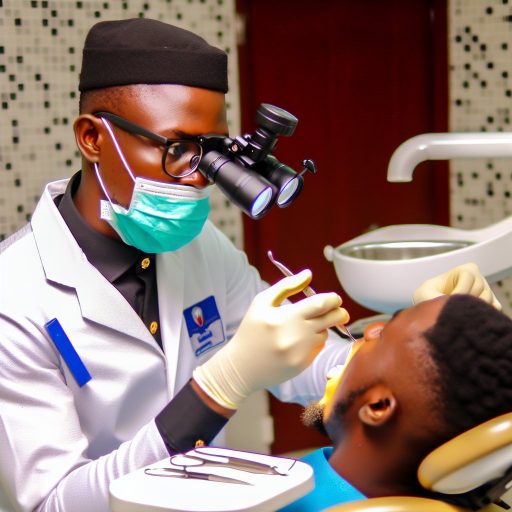Anatomical Pathology
Anatomical pathology is a branch of medicine that deals with the diagnosis of diseases through the analysis of tissue samples.
Significance of Anatomical Pathology
It plays a crucial role in healthcare by helping doctors accurately diagnose and treat various medical conditions.
Increasing Demand for Anatomical Pathologists
In Nigeria, there is a growing need for skilled anatomical pathologists to meet the healthcare demands of the population.
This demand is driven by the rise in chronic diseases, the increase in the aging population, and the need for accurate diagnostic services.
Academic Requirements:
- Education and training needed to become an anatomical pathologist in Nigeria
- Importance of obtaining a medical degree and completing residency programs
Education and Training Needed
In order to become an anatomical pathologist in Nigeria, individuals must first complete a Bachelor of Medicine, Bachelor of Surgery (MBBS) degree from a recognized medical school.
This typically takes around 5-6 years to complete and provides the foundational knowledge and skills required to pursue a career in pathology.
After obtaining the MBBS degree, aspiring anatomical pathologists must undergo further specialized training in anatomical pathology.
This training can be obtained through a residency program in pathology, which typically lasts around 4-5 years.
During this time, trainees will have the opportunity to work under the supervision of experienced pathologists and gain hands-on experience in diagnosing diseases through the examination of tissues and cells.
Importance of Obtaining a Medical Degree
Having a medical degree is crucial for individuals aspiring to become anatomical pathologists in Nigeria.
This is because a solid foundation in medicine is necessary in order to understand the complexity of diseases and their impact on the human body.
A medical degree provides the necessary knowledge of anatomy, physiology, pharmacology, and other medical sciences that are essential for diagnosing and treating patients.
Furthermore, obtaining a medical degree demonstrates a commitment to the medical profession and ensures that individuals have a strong understanding of ethical and professional standards in healthcare.
This is especially important for pathologists, who are entrusted with the responsibility of accurately diagnosing diseases and providing critical information to guide patient care.
Completing Residency Programs
Completing a residency program in anatomical pathology is a crucial step in the training process for aspiring pathologists in Nigeria.
These programs provide hands-on experience in diagnosing diseases through the examination of tissues and cells, as well as the opportunity to work with experienced pathologists and other healthcare professionals.
Residency programs also offer a structured curriculum that covers a wide range of pathology topics, including histopathology, cytopathology, autopsy pathology, and molecular pathology.
This comprehensive training ensures that pathologists are well-equipped to accurately diagnose diseases and provide high-quality care to patients.
Job Responsibilities:
Performing detailed examination of tissue, cells, and body fluids to diagnose diseases.
Analyzing samples under a microscope to identify abnormalities or diseases.
Conducting autopsies to determine cause of death and any underlying medical conditions.
Interpreting test results and communicating findings with medical staff and other healthcare professionals.
Documenting and maintaining accurate records of all findings and test results.
Collaborating with other pathologists, oncologists, and healthcare providers to determine the best course of treatment.
Participating in research studies to develop new diagnostic techniques and treatment options.
Staying current on the latest advancements in anatomical pathology and attending continuing education courses.
Ensuring compliance with regulatory guidelines and standards to maintain quality and accuracy in testing procedures.
Explanation of Conducting Autopsies, Analyzing Tissue Samples, and Diagnosing Diseases:
Anatomical pathologists play a crucial role in the healthcare system by conducting autopsies, analyzing tissue samples, and diagnosing diseases.
Autopsies are performed to determine the cause of death and to identify any underlying medical conditions that may have contributed to the individual’s demise.
This involves a thorough examination of the body, including internal organs, to look for signs of disease or injury.
In addition to autopsies, anatomical pathologists also analyze tissue samples obtained from surgeries, biopsies, or other procedures.
These samples are examined under a microscope to identify abnormalities, such as cancerous cells or inflammatory conditions.
By studying the structure and composition of tissues, pathologists can make accurate diagnoses and help guide treatment decisions.
Diagnosing diseases is a critical aspect of an anatomical pathologist’s responsibilities.
By analyzing test results, including blood work, imaging studies, and tissue samples, pathologists can identify the presence of diseases or medical conditions.
This information is essential for determining the appropriate course of treatment and ensuring the best possible outcomes for patients.
Overall, anatomical pathologists play a vital role in the healthcare system by providing accurate diagnoses, guiding treatment decisions, and contributing to medical research and advancements.
Their work is essential for improving patient outcomes and advancing our understanding of various diseases and conditions.
Find Out More: History of Radiological Science in Nigeria
Work Environment:
Anatomical pathologists in Nigeria typically work in a variety of settings including hospitals, laboratories, and research institutions.
Transform Your Career with Expert Guidance
Get personalized mentorship consulting that’s tailored to your unique path. Our expert advice is actionable and exclusive.
Get StartedTheir primary role is to examine tissue samples and provide diagnoses based on their findings.
In hospitals, anatomical pathologists work closely with other healthcare professionals to diagnose diseases and determine appropriate treatment plans for patients.
They perform autopsies to determine the cause of death and provide valuable information for medical research.
Laboratories are another common work environment for anatomical pathologists in Nigeria.
Here, they analyze tissue samples under microscopes and perform tests to identify abnormalities and diseases.
They work with state-of-the-art equipment to ensure accurate and thorough analysis.
Research institutions also employ anatomical pathologists to study diseases at a deeper level.
They conduct experiments, analyze data, and contribute to scientific publications that advance medical knowledge and patient care.
The working conditions for anatomical pathologists can vary depending on the setting.
In hospitals, they may work long hours and be on call to handle emergencies and urgent cases.
Laboratories typically have more regular hours, but may require weekend or evening shifts at times.
Despite the demanding nature of the work, anatomical pathologists find great satisfaction in helping patients and contributing to the field of medicine.
Their keen eye for detail and passion for pathology drive them to excel in their roles and make a difference in healthcare.
Delve into the Subject: Preventive Dentistry: Addressing Bad Breath
Salary and Job Outlook:
- Overview of the average salary range for anatomical pathologists in Nigeria
- Information on the job prospects and growth opportunities in the field
Anatomical pathology is a specialized branch of medicine that deals with the diagnosis and study of diseases through the examination of tissues and organs.
In Nigeria, anatomical pathologists play a crucial role in providing accurate diagnoses to guide patient care.
Let’s delve into the salary and job outlook for professionals in this field.
Salary Range:
As an anatomical pathologist in Nigeria, the average salary range varies depending on factors such as experience, level of education, and location of work.
On average, entry-level pathologists can expect to earn between ₦100,000 to ₦150,000 per month, while experienced pathologists with advanced degrees and certifications can earn upwards of ₦500,000 monthly.
Private practices and specialized medical facilities tend to offer higher salaries compared to public or government-run hospitals.
The salary range can also vary based on the region, with urban areas typically offering higher compensation than rural areas.
Overall, anatomical pathologists in Nigeria are well-compensated for their expertise and essential role in the healthcare system.
Job Prospects and Growth Opportunities:
The field of anatomical pathology in Nigeria is experiencing steady growth, driven by advancements in medical technology and an increased focus on preventive healthcare.
Job prospects for pathologists are expected to remain favorable, with a growing demand for skilled professionals in both clinical and research settings.
Pathologists have diverse career opportunities, ranging from diagnostic pathology to teaching and research positions in academic institutions.
With the rise of private laboratories and medical centers, there is a demand for pathologists to provide specialized services and consultations.
This creates avenues for career advancement and professional development in the field.
Moreover, the globalization of healthcare services has opened up opportunities for pathologists to collaborate with international organizations and participate in research projects on a global scale.
This exposure not only enhances professional growth but also contributes to the exchange of knowledge and best practices in the field of anatomical pathology.
Anatomical pathologists in Nigeria can look forward to a rewarding career with competitive salaries and ample opportunities for growth and advancement.
By staying updated on the latest developments in the field and cultivating specialized skills, pathologists can carve out a niche for themselves in this dynamic and evolving field of medicine.
See Related Content: Eye Care for Children: What Nigerian Parents Should Know

Skills and Qualities
Being an anatomical pathologist in Nigeria requires a unique set of skills and qualities to excel in this field. Here is a list of essential attributes that are crucial for success:
- List of essential skills and qualities needed to succeed as an anatomical pathologist.
- Emphasis on attention to detail, critical thinking, and communication skills.
Attention to Detail
One of the most important skills for an anatomical pathologist is attention to detail. This involves thoroughly examining and analyzing tissue samples to accurately diagnose diseases or conditions.
Critical Thinking
Anatomical pathology involves interpreting complex data to reach a diagnosis. Critical thinking skills are essential for analyzing information, identifying patterns, and making accurate conclusions.
Communication Skills
Effective communication is vital in anatomical pathology. Pathologists must be able to clearly convey their findings to other healthcare professionals, patients, and their families. This includes writing detailed reports and discussing diagnoses.
Problem-Solving Skills
Pathologists often encounter challenging cases that require innovative solutions. Strong problem-solving skills are essential for navigating complex diagnostic dilemmas and providing the best possible patient care.
Scientific Knowledge
Anatomical pathologists need a strong foundation in biological sciences, anatomy, and pathology. Keeping up-to-date with advancements in medical research and technology is crucial for accurate diagnosis and treatment planning.
Teamwork
Collaboration with other healthcare professionals is a key aspect of anatomical pathology. Pathologists work closely with surgeons, radiologists, oncologists, and other specialists to ensure comprehensive patient care and accurate diagnoses.
Time Management
Anatomical pathologists often work under tight deadlines, especially in urgent or emergency cases. Effective time management skills are crucial for prioritizing workload, completing tasks efficiently, and meeting reporting deadlines.
Professionalism
Pathologists must uphold high ethical standards, maintain confidentiality, and adhere to professional codes of conduct. Professionalism is essential for building trust with patients, colleagues, and the wider healthcare community.
Adaptability
The field of anatomical pathology is constantly evolving, with new technologies, diagnostic tools, and treatments emerging regularly. Anatomical pathologists must be adaptable and open to learning new skills to stay relevant in their practice.
A successful career in anatomical pathology in Nigeria requires a combination of technical expertise, interpersonal skills, and a commitment to lifelong learning. By developing and honing these essential qualities, pathologists can make a significant impact on patient care and healthcare outcomes.
Explore Further: The Future of Restorative Dentistry in Nigeria
Anatomical pathology in Nigeria offers diverse career opportunities for medical professionals.
Pathologists play a crucial role in diagnosing diseases through the examination of tissues and cells.
They work in hospitals, research institutions, and private laboratories to provide accurate and timely diagnoses.
Benefits of a Career in Anatomical Pathology
Job security is high as the demand for pathologists continues to grow in Nigeria.
Pathologists have the opportunity to specialize in areas such as surgical pathology, cytopathology, or forensic pathology.
They often collaborate with other medical professionals to provide comprehensive patient care.
Challenges in Anatomical Pathology
Pathologists must keep up-to-date with advancements in technology and medical research.
Workload can be heavy, requiring long hours of examining tissue samples and preparing reports.
Pathologists may face emotional stress when dealing with serious or unexpected diagnoses.
Importance of Anatomical Pathology in Healthcare
Anatomical pathology is vital for accurate diagnosis and treatment planning.
Consider a career in anatomical pathology for a rewarding and impactful role in healthcare.
Additional Resources
Analysis of the genomic landscapes of Barbadian and Nigerian …




